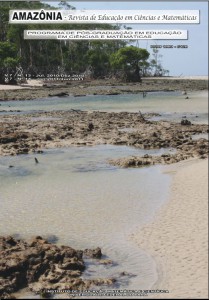Science and mathematics education in the amazon: Possibilities of interpretative research
DOI:
https://doi.org/10.18542/amazrecm.v7i0.1694Keywords:
educational research, interpretive paradigm, positivist paradigmAbstract
This article discusses scientific paradigms of research in Education with emphasis in science education. It aims to make a brief discussion of the interpretative paradigm, reflecting on its possibilities in research in Mathematics and Science Education in the context of the Amazon region. It questions whether educational research in science and mathematics, based on assumptions from the interpretative paradigm, intend to further studies in these areastaking into account the specificities of the Amazon, with everything that concerns the people who inhabit this vast region, not limited only to its biodiversityReferences
ANDRADE, S. M. O.; TANAKA, O. Y. Interacionismo Interpretativo: uma nova perspectiva para a pesquisa qualitativa. Ensaios e Ciência, Campo Grande, v. 5, n.3, p. 55-61, 2001.
BORGES, M. C.; DALBERIO, O. Aspectos metodológicos e filosóficos que orientam as pesquisas em educação. Revista Ibero americana de Educación, OEI, v. 43, n. 5, p. 1-10, jul. 2007.
BRUNER, J. A cultura da educação. Porto Alegre: ArtMed, 2001.
BRUNER, J. Atos de significação. Porto Alegre: ArtMed, 1997a.
BRUNER, J. Realidade mental, mundos possíveis. Porto Alegre: ArtMed, 1997b.
CHIZZOTTI, A. A pesquisa qualitativa em ciências humanas e sociais: evolução e desafios. Revista Portuguesa de Educação, Braga, Portugal, Universidade do Ninho, v. 16, n. 2, p. 221-236, 2003.
ERICKSON, F. Qualitative methods in research on teaching. In: WITTROCK, M. C. Handbook of research on teaching. New York:Macmillan, 1986. p. 162-213.
FIORENTINI, D.; LORENZATO, S. Investigação em educação matemática: percursos teóricos e metodológicos. Campinas: Autores Associados, 2006.
GONÇALVES, M. A. S. Estudo de Caso: reflexões sobre paradigmas. Unirevista, Porto Alegre, n. 1, p. 19-22, 2006.
GOODSON, I. Currículo, narrativa e o futuro social. Revista Brasileira de Educação, Rio de Janeiro, v. 12, n. 35, p. 241-252, maio/ago. 2007.
JAPIASSU, H. Introdução ao pensamento epistemológico. Rio de Janeiro: Francisco Alves, 1992.
LESSARD-HÉBERT, M.; GOYETTE, G.;BOUTIN, G.Investigação qualitativa: fundamentos e práticas. Lisboa: Instituto Piaget, 1990.
MARTINES, E. A. L. M. Contribuições da Psicologia Cultural para estudos de processos educacionais. In: SOUZA, A.M.L. e outros. Psicologia, Saúde e Educação: desafios na realidade amazônica. São Carlos: Pedro e João Editores. Porto Velho: EDUFRO, 2009.
PÉREZ GÓMEZ, A. I. Compreender o ensino na escola: modelos metodológicos de investigação educativa. In: GIMENO SACRISTÁN, J.; PÉREZ GÓMEZ, A. I.Compreender e transformar o ensino. Porto Alegre: ArtMed, 1998.
PONTE, J. P. Investigar a nossa própria prática. In: GTI (org.). Reflectir e investigar sobre a prática profissional. Lisboa: APM, 2002, p. 5-28.
SÁNCHEZ GAMBOA, S. A. A dialética na pesquisa em educação: elementos de contexto. In: FAZENDA, I. (org.) Metodologia da pesquisa educacional. São Paulo:Cortez, 1989, p. 91-115.



